Talk to a Registered Dietitian and use INSIDER20 for 20% off!
Talk to a real Dietitian for only $99: Schedule Now
This post contains links through which we may earn a small commission should you make a purchase from a brand. This in no way affects our ability to objectively critique the products and brands we review.
Evidence Based Research To fulfill our commitment to bringing our audience accurate and insightful content, our expert writers and medical reviewers rely on carefully curated research.
Read Our Editorial Policy
Coasting to prominence on the hype-filled train that is fitness supplement marketing, the popularizing of turkesterone is playing out ever-so predictably.
Of course, hype or lack thereof doesn’t affect how well this purportedly muscle-boosting steroid hormone works, or whether it works at all.
As such, we’ll shift our attention from the fancy labels to considerably less flashy, but much more informative reading material: the research.
Using an evidence-based approach, this article will walk you through an introduction to turkesterone, how it works, and whether or not it’s safe and effective enough to be worth considering.
Before you think it (or perhaps, too late?), we’ll get this out of the way first: turkeys are in no way involved.
Despite its apparent namesake, turkesterone is actually derived from certain arthropods and plants.
Its roles vary depending on the species of plant or animal, often including molting, reproduction, fending off predators, and more.
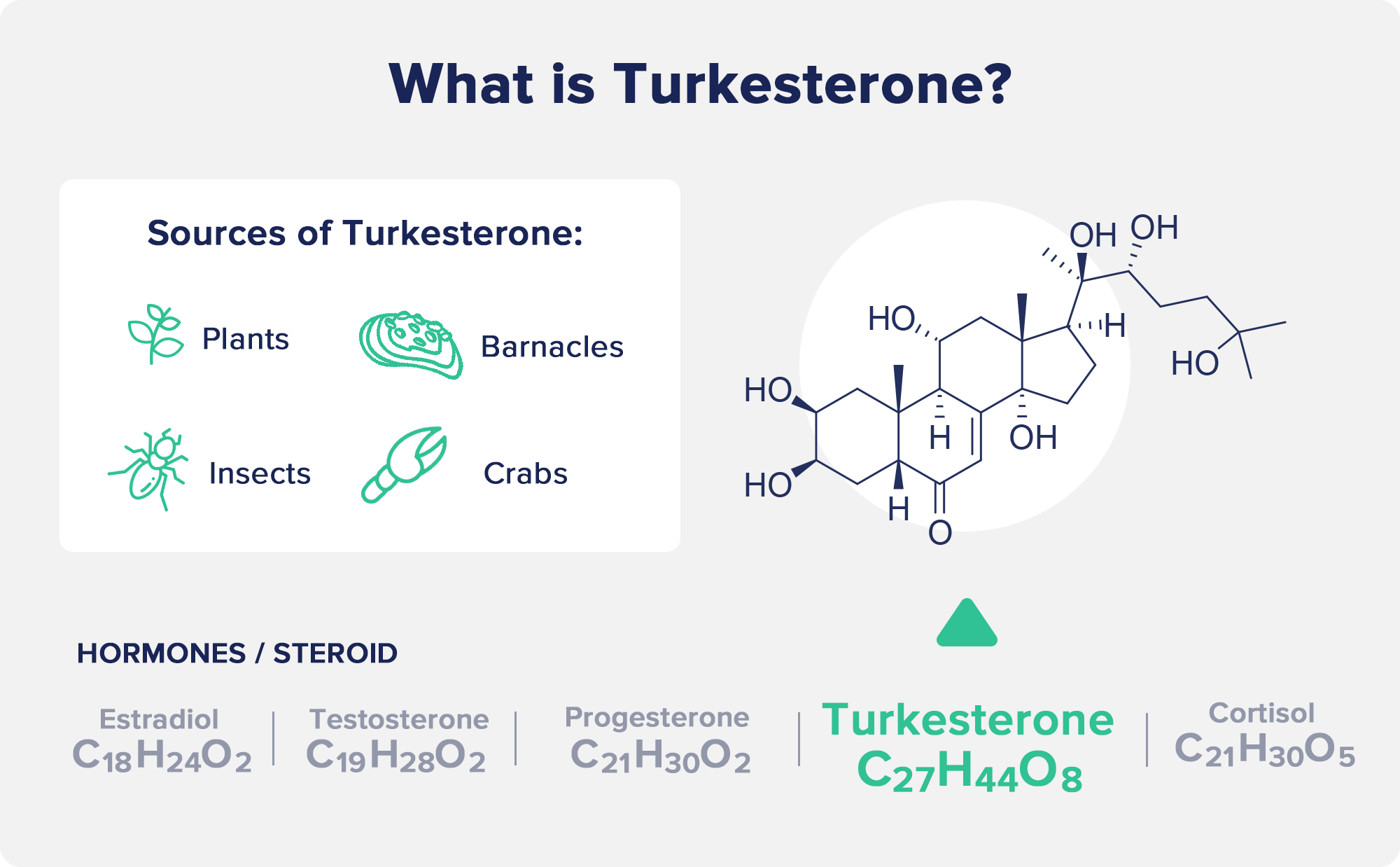
As for its chemical makeup, turkesterone is an ecdysteroid, which refers to a broader classification of similar steroid hormones often derived from the same sources.
In humans, steroid hormones are vital chemical messengers that interact with cells throughout the body’s tissues to support a broad range of bodily processes, including development, reproduction, metabolism, and more.
Following suit, ecdysteroids like turkesterone are purported to have anabolic effects—particularly, synthesizing proteins—but even on this fundamental point, studies already disagree (more on this below).
Of course, this question mark hovering over the research consensus hasn’t stopped some turkesterone supplements from touting a generous handful of tenuously established benefits.
We’ll break this down by comparing turkesterone supplement claims to the research findings.
Though they vary slightly depending on the brand and the formulation, most turkesterone supplements produce a list of potential benefits that looks something like this:
Several of these claims have been at least partially substantiated by research findings.
However, our major disclaimer before digging into the evidence is this: there is a serious deficit in human clinical trials.
The overwhelming majority of studies examining these claims involve animal participants, and some of them focus on ecdysteroids in general, whether or not turkesterone is actually used.
That out of the way, here’s what the research has to say about some of the major turkesterone supplement claims.
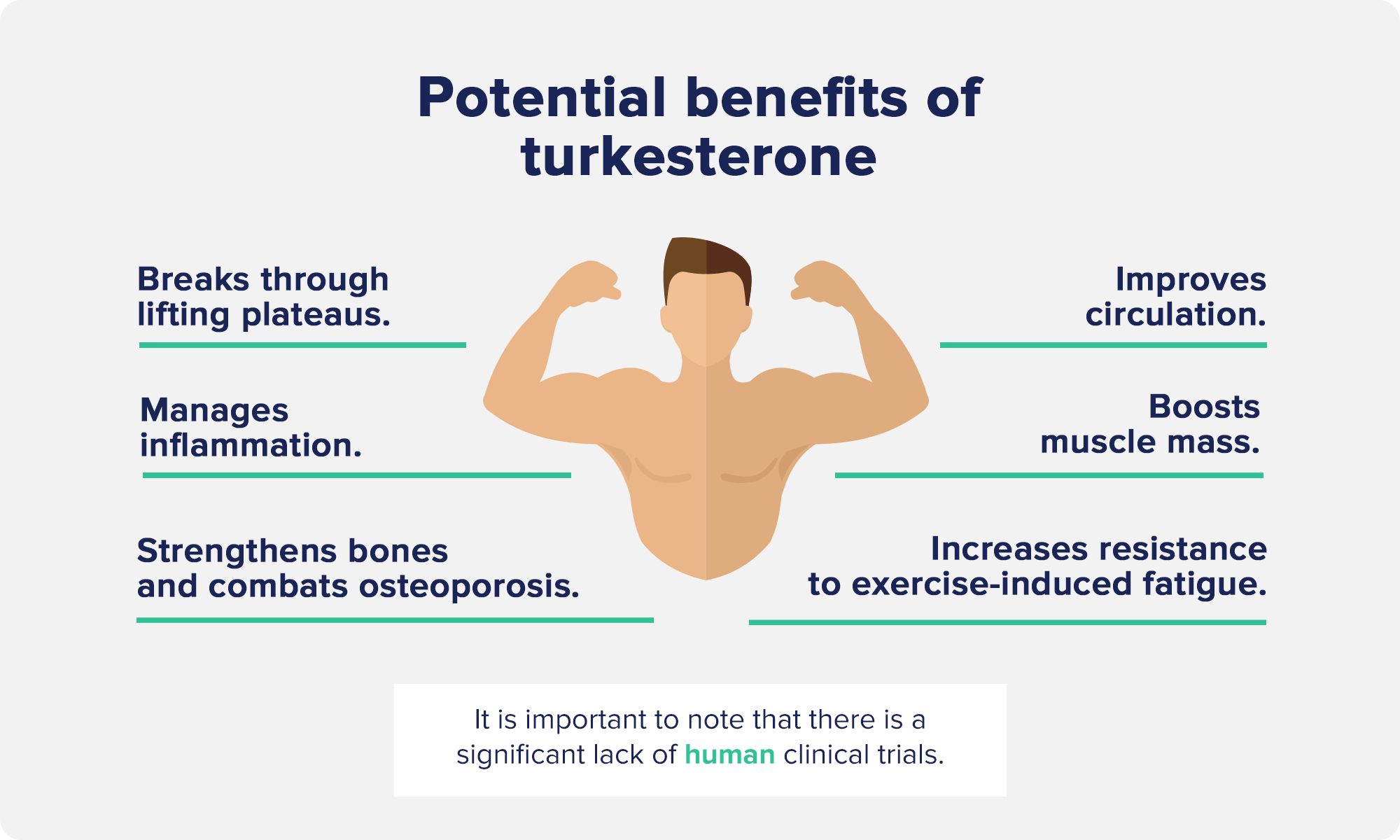
Some findings like this comparative study claim that turkesterone and other ecdysteroids cause a “rate increase of protein macromolecules formation” (in white mice), essentially describing an anabolic effect.
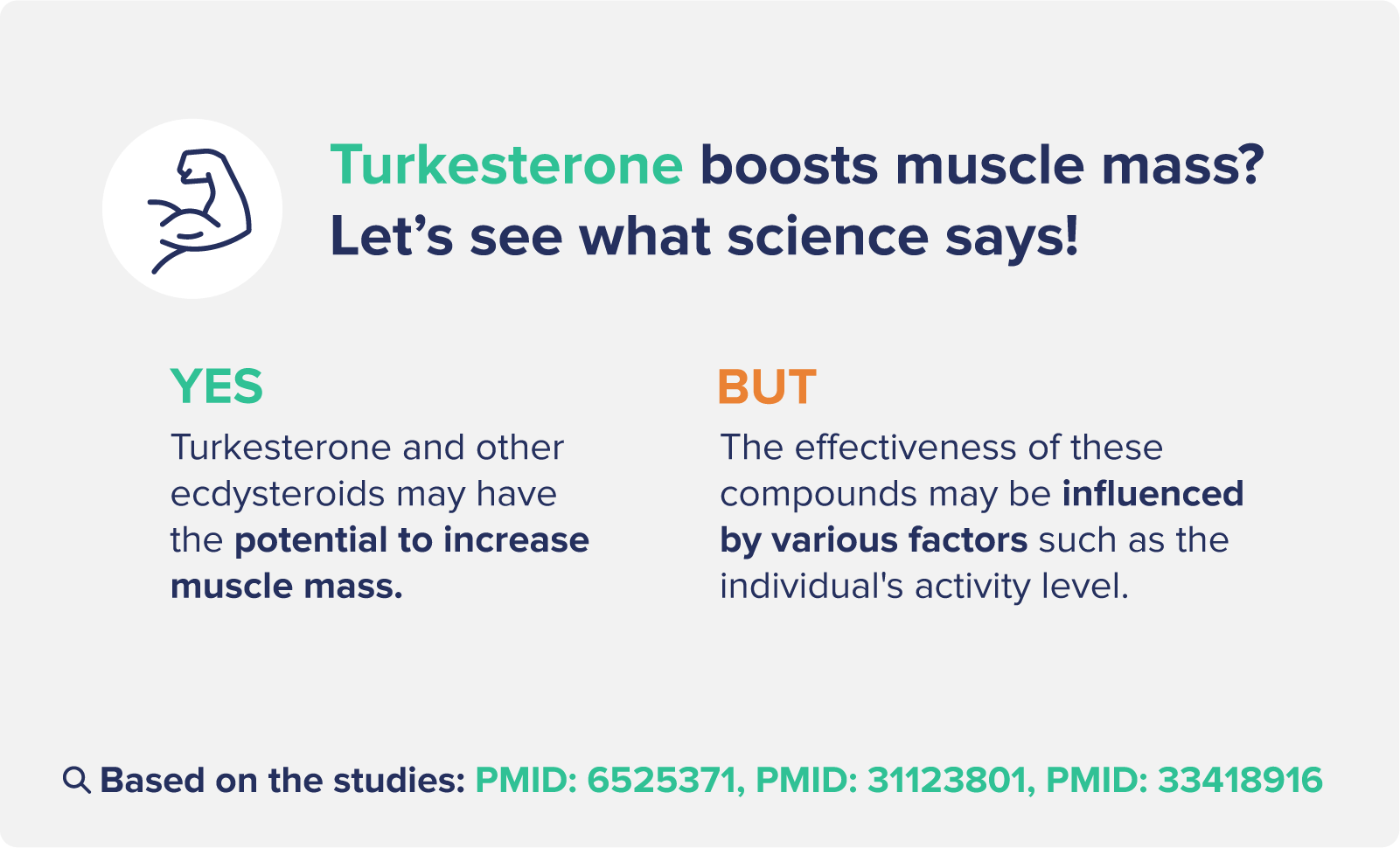
One of the few ecdysteroid studies conducted on humans, a 10-week trial, supports this claim by demonstrating that ecdysterone supplementation caused “significantly higher increases in muscle mass” in male participants as compared to placebo.
However, this application is narrower than researchers initially thought.
Some studies like this one from the International Journal of Environmental Research and Public Health outline limitations to this effect in their conclusions, reporting in this case that ecdysteroids caused zero increase in muscle mass or protein synthesis signaling markers in sedentary aging mice.
In other words, there’s promise for an anabolic effect, but the parameters required for this effect to take hold (including which ecdysteroids are most effective in this regard) are still very hazy.
This study from Hefei University of Technology in China demonstrated a clear anti-inflammatory potential of ecdysterone in lab rats affected with oral mucositis (inflammation of the mucous membranes in the mouth).
Oral mucositis is a common issue among humans undergoing radiation therapy that limits safe (radiation) dosage.
However, there are multiple caveats here, including the fact that the ecdysterone was administered alongside the herbal extract paeonol, and that ecdysterone, while an ecdysteroid, is obviously not turkesterone.
Still, within this limited context, the ecysterone-paeonol combination was more than a little effective in improving the inflammation, positively affecting 19 “function targets” related to the inflammatory process, such as wound healing, apoptosis (appropriately “scheduled” cell death), and more.
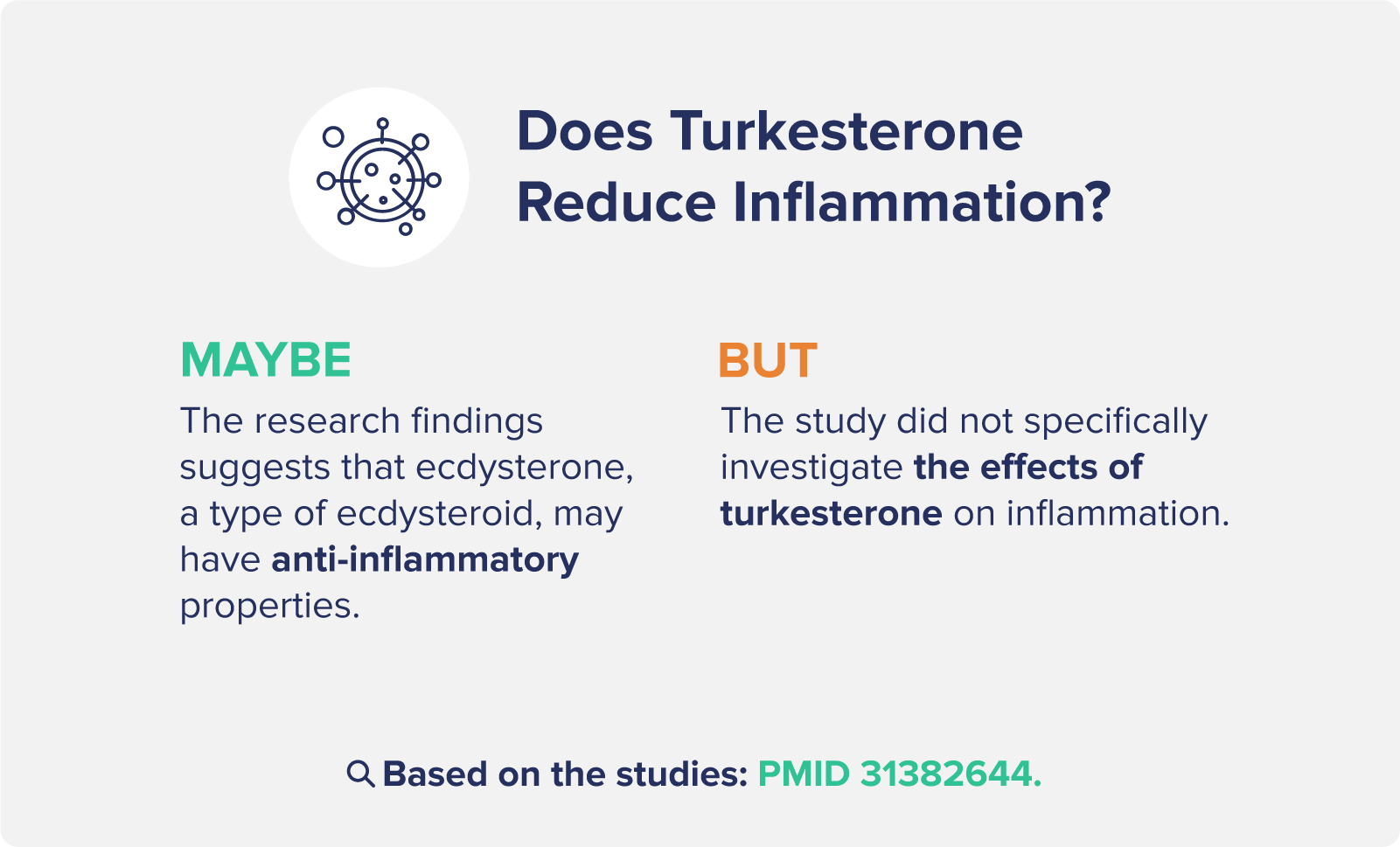
Finally, a naturally occurring form of ecydsterone (called “beta-ecdysterone”) was shown in this study to have “stimulatory effects on osteogenic differentiation via the ER (estrogen receptor).”
This is a fancy way of saying that beta-ecdysterone encouraged the formation of bone-forming cells (osteoblasts) from stem cells.
While ecdysteroids are classified as non-androgenic steroids, meaning they don’t affect estrogen or testosterone levels (and are thus much less likely to cause symptoms like hair loss, gynecomastia, etc.), this is one of several studies on record that suggests they still act on estrogen receptors.
Supplements like NatureBell Turkesterone are already leveraging this form of ecdysteroid, though their beta-ecdysterone (and turkesterone) supplement is still sticking to the anabolic action as far as marketing claims go.
And yes, for those gentlemen not in the know, we have (and use) estrogen receptors also.
But despite this seemingly promising case of anti-osteoporitic activity, we’re once again very limited by context, having little evidence of this action in humans and even less proof of turkesterone (versus the more commonly used example of ecydsterone) promoting this effect.
Now that we’ve had at least a quick survey of the broader knowledge base relating to turkesterone and other ecdysteroids, we can reasonably conclude that several turkesterone supplement claims are at least based on research findings.
However, the knowledge base is in dire need of filling in, particularly in the vein of robust, human clinical trials featuring turkesterone specifically.
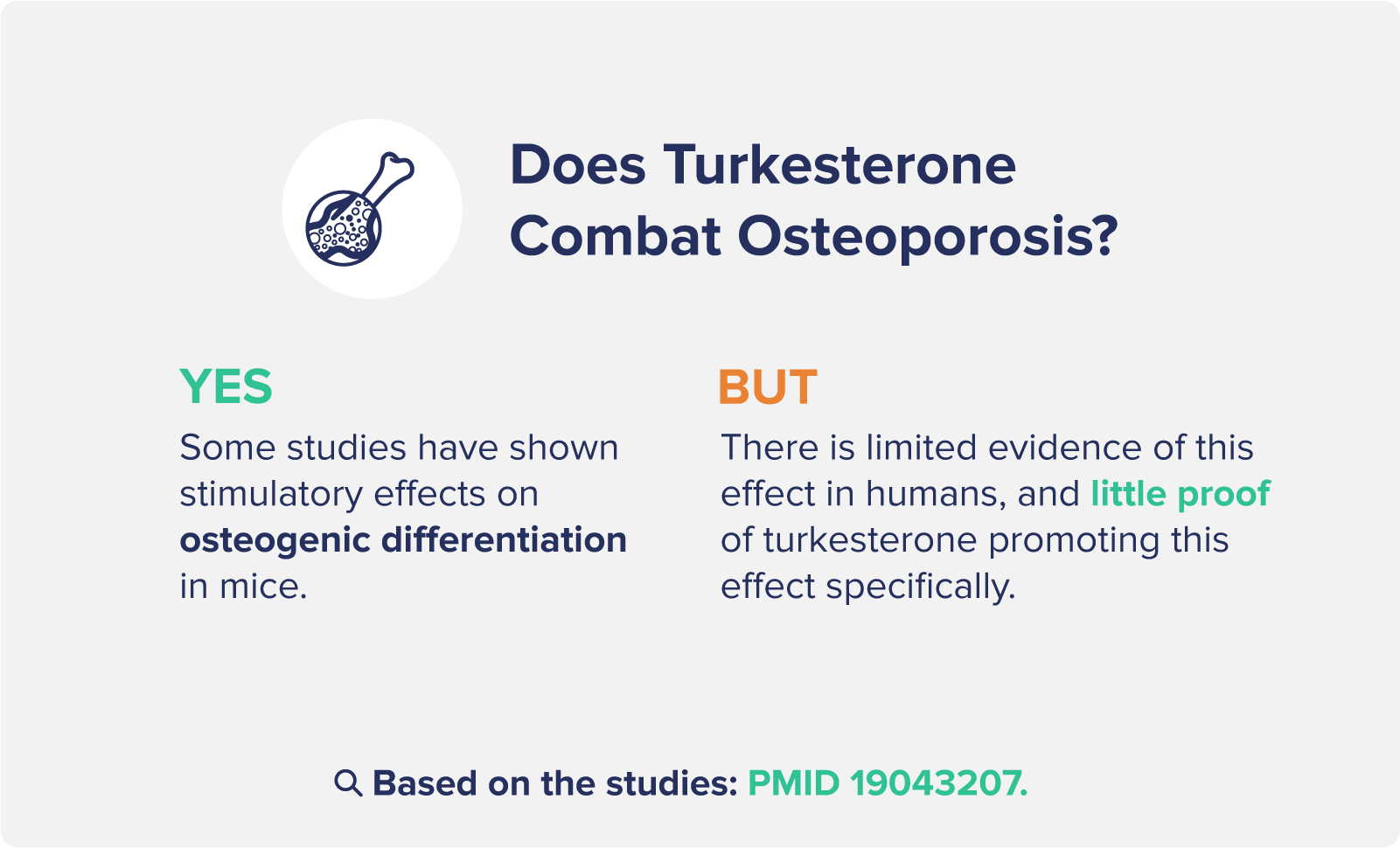
As mentioned, the “non-androgenic” properties of turkesterone make it a preferred choice among men and women who are looking for an athletic performance booster that doesn’t monkey with sex hormone levels.
Let’s dive into this a bit more to clarify the advantages and differences between these two hormones.
Testosterone itself is an androgenic steroid; a male sex hormone (from the Greek anthras for man) that signals androgen receptors, which in turn create proteins responsible for muscle growth, secondary sex characteristics, and so forth.
Turkesterone, on the other hand, stimulates beta-estrogen receptors in a way that doesn’t promote these sex-related changes.
So, while a surplus or shortage of testosterone can cause lower bone mass, erectile dysfunction, hair loss, and other symptoms that sometimes affect both genders, turkesterone doesn’t enter this playing field because it interacts with unrelated receptors.
Hypothetically, if a much-needed influx of turkesterone studies were to confirm all the claims of turkesterone supplements, it would indeed offer an athletic performance boost for both genders that steers clear of the side effects of testosterone.
Of course, for anyone who is declared by a physician to have low testosterone, turkesterone is not going to be an effective stand-in.
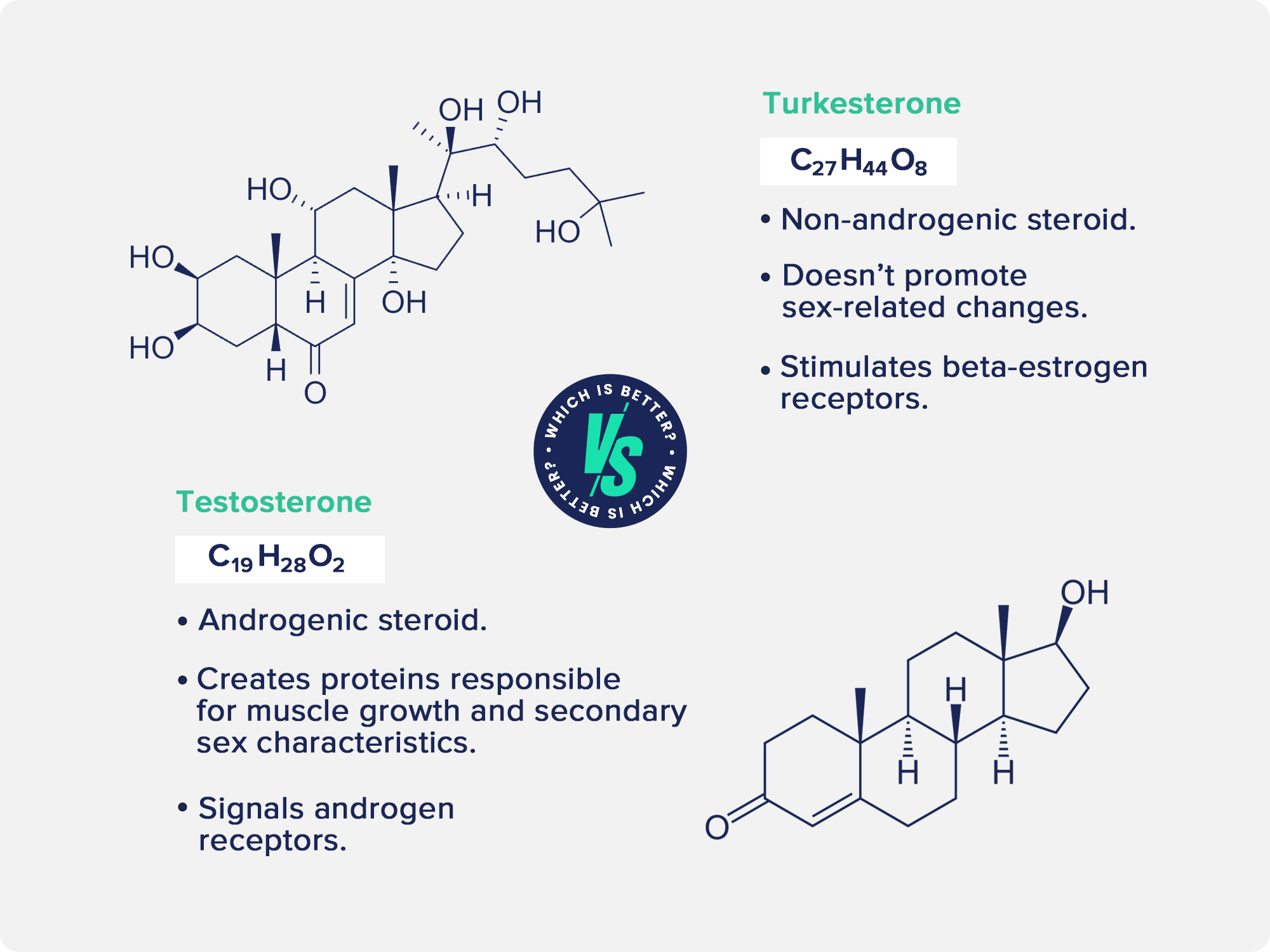
Safety data and turkesterone dosage parameters are very much unexplored when it comes to ecdysteroids and/or turkesterone.
Most studies provide a cursory mention of the “general tolerability” and safety of turkesterone, often reporting either zero or very few adverse events.
However, no major studies directly addressing the safety profile for the human use of turkesterone have been conducted, and assuming a high tolerability based on turkesterone being a naturally occurring compound is unwise (arsenic is naturally occurring, too).
The anecdotal accounts that we are consequently limited to point to a range of fairly mild and infrequent side effects, which include headaches, fatigue, and upset stomach among the most common turkesterone side effects.
As for the response from athletes, some prefer the alleged performance-boosting benefits of ecdysterone to other anabolics and/or hormones because it is reportedly less problematic in terms of unwanted side effects.
At this time, turkesterone is still completely legal to take in the USA, and is not banned by the World Anti-Doping Agency (WADA).
However, one of turkesterone’s “molecular cousins,” ecdysterone, is officially on the World Anti-Doping Agency’s 2023 Monitoring Program, which lists substances the agency is closely watching to determine whether or not they should be banned in the future.
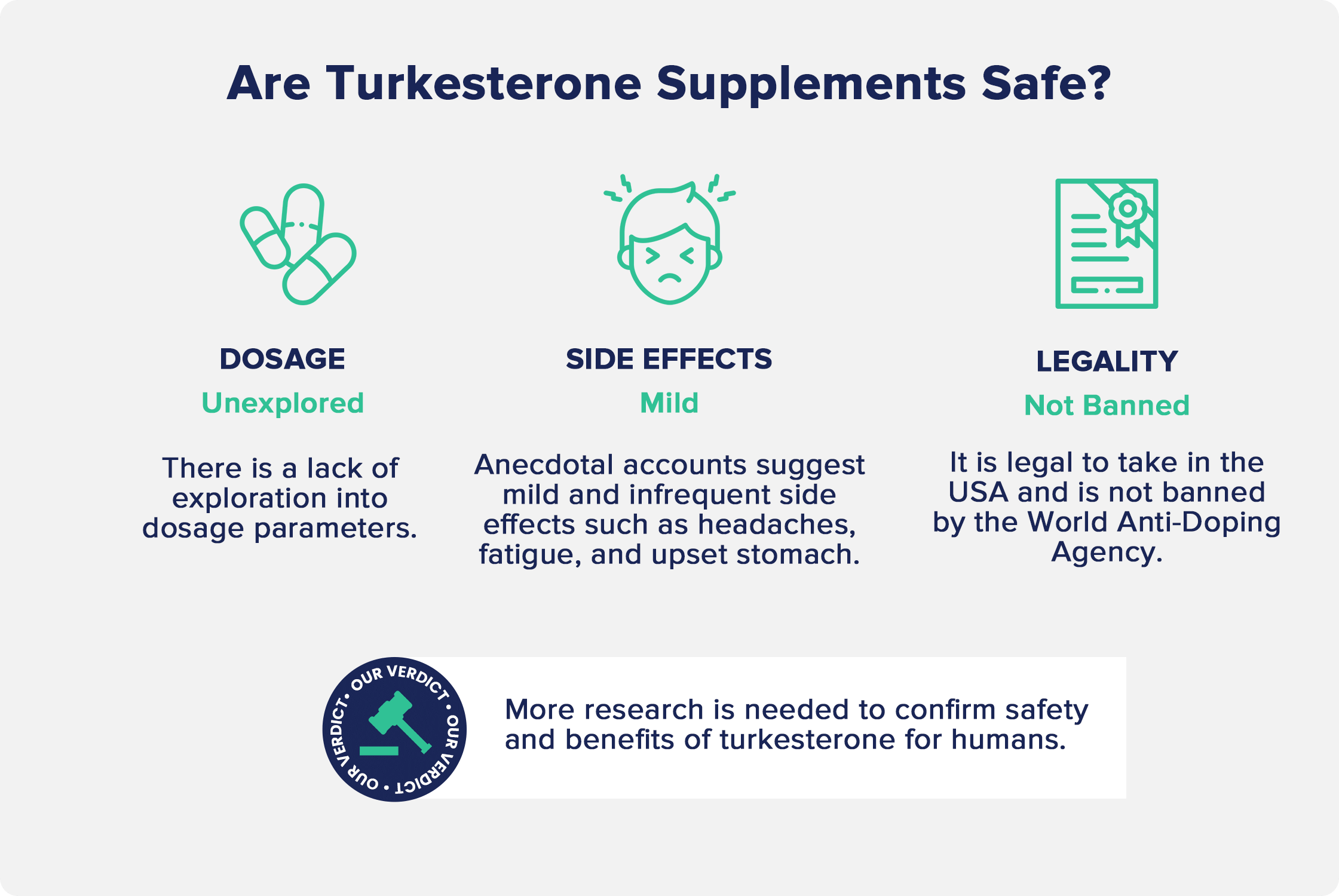
Turkesterone is a steroid hormone derived from plants like ajuga turkestanica and arthropods (certain insects, crabs, barnacles, and more).
This hormone is believed to mimic some of the effects of testosterone in humans, but without actually affecting androgen (sex hormone) levels.
While the research consensus at this point indicates that turkesterone is safe for human consumption, much more research is needed to fully assess safety as well as potential turkesterone benefits.
The sale and use of turkesterone is completely legal in the United States and many other countries at this time. The World Anti-Doping Agency (WADA) is monitoring ecdysterone (a closely related compound to turkesterone), but has not officially banned it for use by athletes subject to WADA rules.
More research is needed, but the knowledge base at this time at least hints at the potential of turkesterone and/or related ecdysteroids as anabolic agents, meaning they may boost muscle growth among other testosterone-like functions. Some studies on animals also suggest that ecdysteroids can combat inflammation and stimulate bone growth.
Yes. However, it’s important to distinguish this naturally occurring steroid from synthetic anabolic steroids that mimic testosterone.
Even though turkesterone is a non-androgenic steroid, meaning it is far less likely to destabilize your body’s sex hormones (which can cause all kinds of symptoms), some users have reported mild cases of fatigue, nausea, and headaches.
This is not an exhaustive list, and each person’s experience can vary.
This answer depends on your particular goals, your budget, the results (if any) you experience from turkesterone, and other factors.
Many people who exercise and compete at high levels stand by turkesterone as a muscle booster that can poke through strength plateaus with fewer side effects than testosterone, but others (especially those who don’t perform at such high levels) may not experience this effect.
Turkesterone is a naturally derived steroid hormone that interacts with the body in a way that allegedly mimics some of the effects of testosterone with a (once again, alleged) potential for fewer side effects.
The verdict on turkesterone as a natural athletic performance booster is a thin, but mostly positive one. Much more research involving human participants is required, including safety data and dosage parameters.
Turkesterone is legal to take in the USA, including among elite athletes, though ecdysterone (a closely related compound) is being monitored by the World Anti-Doping Agency.
As always, if you decide to try a turkesterone supplement, we highly recommend consulting with a doctor and/or shopping only the most reputable brands that use third-party tested ingredients.